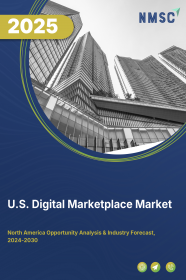
U.S. Digital Marketplace Market by Platform (Desktop, Mobile, and Tablets), by Model Type (Business to Business (B2B), Business to Consumer (B2C), and Consumer to Consumer (C2C)), and by End Users (Commercial, and Personal)- Opportunity Analysis and Industry Forecast, 2024– 2030
Industry: ICT & Media | Publish Date: 02-Jan-2025 | No of Pages: 135 | No. of Tables: 101 | No. of Figures: 46 | Format: PDF | Report Code : IC2236
US Tariff Impact on U.S. Digital Marketplace Market
Trump Tariffs Are Reshaping Global Business
U.S. Digital Marketplace Market Overview
The U.S. Digital Marketplace Market size was valued at USD 87.86 billion in 2023, and is predicted to reach USD 212.77 billion by 2030, at a CAGR of 13.3% from 2024 to 2030. Digital marketplace market, also referred to as online marketplaces or digital commerce platforms, serve as virtual meeting points where individuals engage in transactions to buy or sell goods, services, or information. These platforms act as intermediaries, facilitating exchanges between various parties, such as buyers and sellers, within a centralized online environment tailored for effortless product discovery, purchasing, and delivery. Prominent examples of online marketplaces include well-established e-commerce platforms such as Amazon, eBay, and Alibaba, as well as service-oriented platforms such as Upwork and Fiverr.
Utilizing technology, these platforms streamline transaction processes, ensuring efficient and secure payment processing while safeguarding the financial information of all parties involved. Moreover, they enhance user experiences by offering features such as customer reviews, ratings, and mechanisms for resolving transaction-related issues. Consequently, online marketplaces leverage technology to improve the overall online commerce experience, making it simpler and safer for both buyers and sellers. They play an indispensable role in today's economy by bridging the gap between businesses and consumers across geographical boundaries, thereby facilitating seamless and convenient global commerce.
Growth of E-commerce Industry Drives the U.S. Digital Marketplace Market Growth
The U.S. maintains a dominant position in the digital marketplace market, primarily due to the growth of the e-commerce industry in the region. According to the International Trade Administration, the U.S. e-commerce industry is projected to achieve a compound annual growth rate of 11.22% by 2027.
As more consumers transition towards online shopping, there is an escalating demand for convenient platforms offering a diverse array of products and services from various sellers. Online marketplaces function as centralized hubs facilitating interactions between businesses and consumers, streamlining transactions, and broadening market reach.
With the continuous growth of e-commerce, online marketplaces are anticipated to thrive, offering businesses of all sizes opportunities to access new markets and enhance their online presence. The sustained expansion of e-commerce, driven by evolving consumer preferences and technological advancements, underscores the robust growth prospects of the digital marketplaces market in the U.S.
Increasing Adoption of Smartphones Propels the U.S. Digital Marketplace Market Growth
The U.S digital marketplace market growth is the rising adoption of smartphones. With a growing number of consumers accessing the internet through mobile devices, there is a heightened demand for convenient platforms offering seamless access to shopping opportunities. Online marketplaces address this trend by providing mobile-friendly interfaces and applications that enable users to browse, compare, and purchase products and services effortlessly.
The widespread prevalence of smartphones empowers consumers to engage with online marketplaces anytime and anywhere, fostering greater convenience and accessibility. According to Gitnux, a global commerce media LLC company, smartphone penetration in the U.S. is forecasted to reach 81.5% of the population by 2024. As smartphone adoption continues to surge, the online marketplace market is poised for sustained growth, fueled by the increasing reliance on mobile technology for everyday activities, including shopping.
Presence of Cybersecurity Threats and Apprehensions Regarding Consumer Trust Within Digital Marketplaces Create Impediments to Market Expansion
Cybersecurity threats, such as data breaches and fraudulent activities, pose significant challenges to digital marketplaces by undermining consumer trust. When consumers perceive online platforms as vulnerable to cyberattacks, they hesitate to share personal information or conduct transactions online due to concerns about privacy breaches or financial harm.
This leads to reduced usage of online marketplaces and reluctance to engage in online shopping activities, thus impeding market expansion. Moreover, instances of data breaches or fraudulent behavior damage the reputation of online marketplace, discouraging both consumers and businesses from active participation in the online marketplace environment.
Integration of Augmented Reality (AR) and Virtual Reality (VR) Technologies Offers a Potential Opportunity for Market Expansion
The integration of Augmented Reality (AR) and Virtual Reality (VR) technologies into digital marketplaces is positioned to create lucrative opportunities within the market. By leveraging AR and VR, online marketplaces offer users enhanced and immersive shopping experiences. These technologies enable consumers to visualize products in real-world contexts, virtually test them before making a purchase, and explore interactive virtual environments.
Such immersive experiences not only boost customer engagement and foster brand loyalty but also drive sales. Furthermore, AR and VR empower businesses to effectively showcase their products by providing detailed information and personalized recommendations to users. Therefore, the integration of AR and VR technologies holds significant potential to revolutionize the future landscape of digital commerce platforms by delivering innovative and compelling shopping experiences.
Competitive Landscape
The key market players operating in the U.S. digital marketplace industry include Amazon Inc, Walmart, eBay, Etsy, Best Buy, Anthropologie, Macy’s, FeelUnique, Rakuten, Target, Shopify, Squarespace, Wayfair, StockX, Beyond, Inc and others.
U.S. Digital Marketplace Market Key Segments
By Platform
-
Desktop
-
Mobile
-
Tablets
By Model Type
-
Business to Business (B2B)
-
Business to Consumer (B2C)
-
Consumer to Consumer (C2C)
By End-User
-
Commercial
-
Personal
REPORT SCOPE AND SEGMENTATION:
|
Parameters |
Details |
|
Market Size in 2023 |
USD 87.86 Billion |
|
Revenue Forecast in 2030 |
USD 212.77 Billion |
|
Growth Rate |
CAGR of 13.3% from 2024 to 2030 |
|
Analysis Period |
2023–2030 |
|
Base Year Considered |
2023 |
|
Forecast Period |
2024–2030 |
|
Market Size Estimation |
Billion (USD) |
|
Growth Factors |
|
|
Companies Profiled |
15 |
|
Market Share |
Available for 10 companies |
|
Customization Scope |
Free customization (equivalent up to 80 working hours of analysts) after purchase. Addition or alteration to country, regional, and segment scope. |
|
Pricing and Purchase Options |
Avail customized purchase options to meet your exact research needs. |
KEY PLAYERS
-
Amazon Inc
-
Walmart
-
eBay
-
Etsy
-
Best Buy
-
Anthropologie
-
Macy’s
-
FeelUnique
-
Rakuten
-
Target
-
Shopify
-
Squarespace
-
Wayfair
-
StockX
-
Beyond, Inc

















 Speak to Our Analyst
Speak to Our Analyst




















